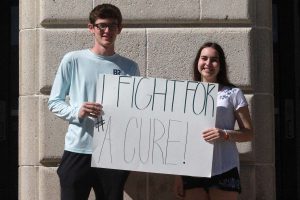Student undertakes cancer work in community
February 26, 2019
Q: How did you get involved in doing cancer work?
A: The summer of freshman year, I was approached with the opportunity to do an internship at the National Pediatric Cancer Foundation. There, I started writing the toolkit for families with children who had cancer.
Q: What inspired you to continue working there?
A: Well, the experience was very rewarding and it felt good to know I was making a real difference in the community. I have always felt that I’ve had the passion to help people.
Q: So how did you and Preslie both get involved in your toolkit project there?
A: Preslie and I have actually known each other for 12 years and one thing we’ve always had in common is the desire to reach out and help others. After that summer internship I did, I recommended Preslie for the position and we ended up working together on special projects for the foundation.
Q: What kind of special projects did you help with?
A: Our biggest and most challenging assignment was definitely writing the toolkit. Our goal was to provide advice and some comfort to families who have children recently diagnosed with cancer, and how to deal with this, because we knew it was a difficult time for both the family and the child.
Q: Can you tell me about the walk that you and Preslie are organizing?
A: Yes, the project we’re currently working on for the National Pediatric Cancer Foundation is a walk called “Walking Funds the Cure.” Together we are mainly focusing on obtaining radio sponsorships, locating local artists to perform and spreading the word to reach our goal of 3,000 attendees.
Q: In your opinion, why should students get more involved in their community?
A: Being part of a community means that you are obligated to contribute something, like your time volunteering or even donating to a local organization, because you never know when you might need it. We’re all part of one community, and sometimes we have to rely on the community for help ourselves, so it’s always seemed right to me to help others when they need it.
Q: What do you consider your biggest accomplishment?
A: I think if we can meet the goal that we’ve set for the walk, it will be my biggest accomplishment. Overall though, I’m really proud of how much of an impact I’ve made on people’s lives, and after writing the toolkit and interning at the National Pediatric Cancer Foundation, I can see that what we’ve been working on has really made a difference, so I guess that would be my biggest accomplishment.
Q: What was the most challenging part?
A: Like I said before, I think writing the toolkit was the most challenging project Preslie and I have taken on, because it was one of the first big things we did at the foundation. You really need to understand what people are going through because they’re going through such a tough time, and you never know how much your actions or words can have an impact on them.
Q: What are your expectations for the future in terms of staying involved with cancer work?
A: Right now, Preslie and I are trying to bring what we’ve learned during our internships to Plant. We’re starting a club called HOSA, Health Occupations Students of America.
Q: What’s your goal in starting this club?
A: First of all, we hope that this gets students at Plant inspired to get more involved in cancer work or whatever they’re passionate about in the community. I think kids will take away from this that maybe they want to reach out in the community and volunteer in a way they wouldn’t have thought of before. But also, I think a reason we’re starting this club is to raise some awareness about cancer and the opportunities to volunteer and help out, like Preslie and I have been doing with the National Pediatric Cancer Foundation.

